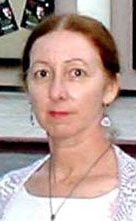|
International
and National News |
Zionist Organization of America finds Pew
survey of American Muslims 'disturbing'
NEW
YORK (Press Release)—The first nationwide survey
of Muslim Americans, carried out by Pew Associates, has revealed that more
than a quarter of Muslim Americans (26%) under the age of 30 believe that
suicide bombings to defend Islam are justified in at least some
circumstances. According to this Pew Global Attitudes survey, "younger
Muslims in the U.S. are much more likely than older Muslim Americans to say
that suicide bombing in the defense of Islam can be at least sometimes
justified."
Other
findings in the Pew Survey:
-
Only 40% acknowledge that Arabs orchestrated the 9/11 terrorist attacks,
while 32% declined to answer the question.
-
16% of Muslim Americans believe that the rights and needs of Palestinian
Arabs cannot be taken care of as long as Israel exists.
-
Only 26% of Muslim Americans believe that the war on terrorism is a
"sincere effort," compared with 67% of the general public.
-
60% of Muslim Americans under the age of 30 regard themselves as Muslim
first, Americans second, while only 25% regard themselves as American
first (47% of the entire population of Muslim Americans regard
themselves as Muslim first and American second, with only 28% regarding
themselves as American first).
-
Only a small majority – 58% – of Muslim Americans have a very
unfavorable view of Al-Qaeda. Also of great concern is the fact that
over a quarter of Muslim Americans declined to indicate their view of
Al-Qaeda).
-
Only a slight majority – 51% – of Muslim Americans are concerned about
the rise of Islamist extremism around world.
(jump to continuation)
________________________________________________________________
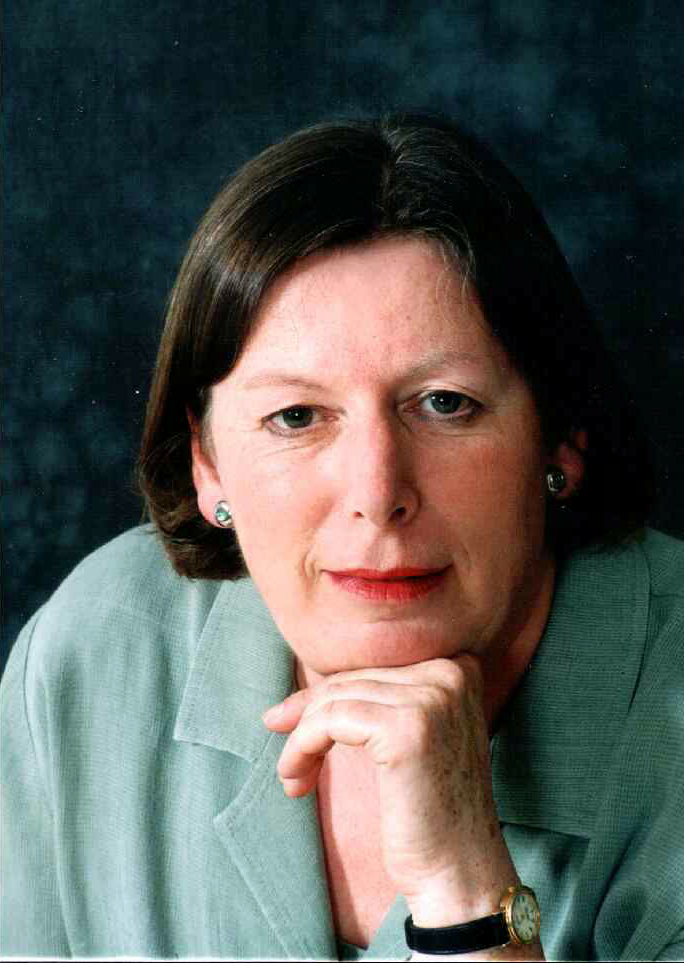 Jerusalem Diaries
Jerusalem Diaries
Judy Lash Balint
___________________________________________________________________________
The Russians have
come! The Russians have come!
JERUSALEM—The courtyard of the late 19th century Sergei Building is an oasis
of tranquility in the
midst of downtown Jerusalem. Tonight the two-story stone walls surrounding
fragrant greenery and an array of casually displayed sculptures reverberate
with the sound of a talented octet of classical musicians—the Pearls of
Music Ensemble.
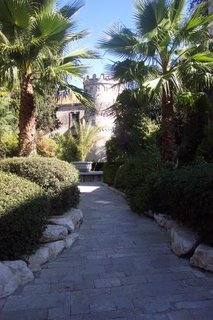 The
concert is one of a series of free events under the rubric of the annual
two-week Israel Festival. In addition to the regular ticketed performances
that fill the city’s concert halls with musicians, dancers and actors from
all over the world, some of Jerusalem’s more unique venues play host to free
events every night. The
concert is one of a series of free events under the rubric of the annual
two-week Israel Festival. In addition to the regular ticketed performances
that fill the city’s concert halls with musicians, dancers and actors from
all over the world, some of Jerusalem’s more unique venues play host to free
events every night.
Was it by chance that Israel Festival planners scheduled the
Russian-speaking immigrant players of Pearls of Music to play at the Sergei
Courtyard? If so, the black-clad musicians seem thoroughly at home in the
stately setting of the building named after Prince Sergei Romanov, who
visited Jerusalem in 1889.
Sergei
Courtyard
In a day that started for me at a press briefing on the Forty Years of War,
where Natan Sharansky, amongst others, discussed the ramifications of the
Six Day War on the modern world, the significance of the influence of Mother
Russia on contemporary Israel is quite striking.
 Sharansky
views the Six Day War in terms of the beginning of the fall of the Soviet
empire. In his view, the 1967 war brought with it the sobering realization
for the Soviets that they would not dominate the Middle East, as well as the
emboldening of Jewish national identity amongst Soviet Jews who would begin
to agitate to leave the Soviet Union creating a movement Sharansky
views the Six Day War in terms of the beginning of the fall of the Soviet
empire. In his view, the 1967 war brought with it the sobering realization
for the Soviets that they would not dominate the Middle East, as well as the
emboldening of Jewish national identity amongst Soviet Jews who would begin
to agitate to leave the Soviet Union creating a movement
Sharansky
that undermined the very notion of the idyllic worker’s paradise and caused
the foundations of Soviet society to crumble.
(Jump
to continuation)

|
Your specialist in
cruises and tours
Upcoming 2007 San Diego sailings:
May 27-December 29: Carnival:
Elation: multiple 4-and 5-day sailings, round trip to Mexico.
Sept 23-Dec 30: Princess Cruises: Dawn Princess: 7-day round trip to
Mexico
Sept. 28: Celebrity Cruises: Summit: 14-day Hawaii
Sept. 29: Holland America: Oosterdam, 7-day Mexico. |
 Jews
in the News Jews
in the News
-------------------------------------------------------------------------------
Like you, we're pleased when members of our community are
praiseworthy, and are disappointed when they are blameworthy.
Whether
it's good news or bad news, we'll try to keep track of what's being said in
general media about our fellow Jews.
Our news spotters are Dan Brin in Los Angeles, Donald H. Harrison in San Diego,
and you. Wherever you are, if you see a story of interest, please send a
summary and link to us at sdheritage@cox.net.
To see a source story click on the link within the respective paragraph.
_______________________________________________________________________
*Frieda Birnbaum, 60, has returned
with her two new babies from a maternity ward to her home in Saddle River, N.J.,
saying everyone is feeling "fine." The Associated Press
story is included in a column of briefs in today's San Diego
Union-Tribune.
*Richard Blum, husband of U.S. Sen. Dianne Feinstein, has
holdings in URS Corp., a company that is now purchasing Washington Group
International for $2.6 billion to create an engineering and construction
powerhouse. In the past Feinstein has been accused of a conflict of
interest for being on a military constructions appropriations subcommittee which
approves military contracts, including those with URS. Feinstein has
denied any conflict. The
story
by Evelyn Iritani is in today's Los Angeles Times.
*Retired Israeli Gen. Shlomo Brom, in a paper published by Tel Aviv
University, concludes there is no sure-fire way to suppress the firing of
Qassams from Gaza short of Israel reoccupying that territory—which would force
Israel to once again become responsible for Gaza's 3 million inhabitants.
The Associated Press
story by Karen Laub is in today's San Diego Union-Tribune.
*With the third installment of the Pirates of the Caribbean so
successful at the box office, there is little question that Jerry Bruckheimer
is planning a fourth installment. The
story by Josh Friedman is in today's Los Angeles Times.
*As president of Disney, Michael Eisner commanded a global empire
with 125,000 employees. After his ouster in 2005, he has adjusted to
downsizing. His small office in Beverly Hills has just five employees.
The
story by Laura M. Holson of the New York Times News Service is in today's
San Diego Union-Tribune.
*U.S. Sen. Carl Levin (D-Michigan), appearing on television's Face
the Nation, disagreed with Republican Sen. Jeff Sessions of Alabama
who said troop reductions are possible in September after General David Petraeus
submits a report evaluating the effect of the recent troop surge. Levin
said there's no reason to wait until then; "we've got men and women dying in
Iraq right now." The
story by Robin Fields is in today's Los Angeles Times.
*Radio talk show host "Dr. Laura" Schlesinger had sold out
audiences for two nights at the 1,523-seat East County Performing Arts Center,
but otherwise attendance at its events has been disappointing. Liz Neely
has the
story in today's San Diego Union-Tribune.
*A side issue in the Phil Spector murder trial is the question of
what impact the trial will have on the reputation of Henry Lee, an ace
criminologist who has been accused of removing evidence from the scene where
Lana Clarkson's body was found. The
story by Matt Krasnowski of the Copley News Service is in today's San
Diego Union-Tribune.
*Bataan Death March survivor Lester Tenney was among World War II
veterans at the La Costa Glen retirement home relating war experiences on
Memorial Day. The
story by Chris Moran is in today's San Diego Union-Tribune.
*The mammoth compromise bill continuing funding for the War in Iraq and
other Defense and Veteran related issues was stripped of a provision sought by
California Democrats to prohibit the administration from leasing or selling the
Veteran's Administration property in West Los Angeles. U.S. Rep. Henry
Waxman (D-California) said the removal of that provision at the behest of
the Bush administration was "an unfortunate setback." The
story by Martha Groves is in today's Los Angeles Times.
(return to top)
__________________________________________
The Jewish Grapevine
 ----------------------------------------------------------------------------------------------------------------- -----------------------------------------------------------------------------------------------------------------
CAMPUS WHIRL—The University of Haifa will
award an honorary doctorate of philosophy on June 5 to
Younes Nazarian of Los Angeles, a philanthropist, industrialist,
businessman and leader of the Iranian-American Jewish community. Haifa
University President
Aaron Ben-Ze'ev said the
honor is for Nazarian's
philanthropic activities in the United States and Israel, in particular "his
generous support of the IDF, the State of Israel and the University of Haifa."
 COMMUNITY
ROUNDUP—We have the names of the women in the winning foursome in the recent
16th annual golf and tennis tournament sponsored by The Guardians to benefit
Seacrest Village Retirement Communities. They were
Sheri Hallis, Kay Weiss, Terry
Cohler, and Lynn Gordon, who are shown in that left to right
order in the adjoining photograph.... COMMUNITY
ROUNDUP—We have the names of the women in the winning foursome in the recent
16th annual golf and tennis tournament sponsored by The Guardians to benefit
Seacrest Village Retirement Communities. They were
Sheri Hallis, Kay Weiss, Terry
Cohler, and Lynn Gordon, who are shown in that left to right
order in the adjoining photograph....
CYBER-JUDAISM—Hillel Mazansky sends along a beautiful Power Point
slide show about Rishon Lezion. Once it
comes onto your screen, you may advance through the photos, by using the space
bar on your computer.
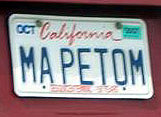 JEWISH
LICENSE PLATE—Melanie Rubin, our top Jewish license plate spotter, found
one in Hebrew slang. Literally translated, Ma Petom means "What
suddenly?" Colloquially, however, it's more like "You've got to be
kidding!" To see our growing Jewish license plate collection, please
click here. JEWISH
LICENSE PLATE—Melanie Rubin, our top Jewish license plate spotter, found
one in Hebrew slang. Literally translated, Ma Petom means "What
suddenly?" Colloquially, however, it's more like "You've got to be
kidding!" To see our growing Jewish license plate collection, please
click here.
MICHAEL MEDVED LECTURE—Have
you ever wondered what the person behind the radio voice looks like, and
whether he or she is tall or short, slender or heavy, dark hair or light? Those
attending a special program featuring Michael Medved sponsored by Chabad
at La Costa won't have to wonder anymore. The event at 7:30 p.m. tomorrow
(Wednesday) night at the Lyceum Theatre at Horton Plaza in downtown San Diego
still has tickets available, advises Rabbi Yeruchem Eilfort. In
fact, he says, "the $25 and $36 tickets are being offered at half price
for
today and tomorrow only. We hope you choose to buy the Patron tickets, which
cost $90 and include the pre-lecture VIP Reception and a signed book from
Michael." Either way, the Lyceum Theater Box Office at (619) 544-1000
would be the place to call.
POLITICAL SCENE—California Insurance Commissioner Steve Poizner today
invited news media to a private home in the Scripps Ranch area of San Diego
to demonstrate how people who live in potential fire areas should make a digital
photo inventory of their possessions, and then store that inventory in a safe
place away from their homes. Poizner said that a consumer guide may be obtained
from his department by calling (800) 927-HELP. ... A new group called the
American Freedom Alliance has announced an all-day seminar June 10 at Pepperdine
University in Malibu on the topic "The Collapse of Europe, the Rise of Islam and
the Consequences for the United States." Among the panelists at the $250
per-person seminar are Daniel Pipes and Dennis Prager.
According to Avi Davis, AFA senior fellow: "European democratic values
have been severely tested in recent years as growing internal Muslim restiveness
and intimidation have imposed a virtual code of silence on the continent's
politicians and media who fail to address Muslim conduct and theology
particularly when they contradict Europe's democratic traditions."
Registration information is on the
conference website.
|

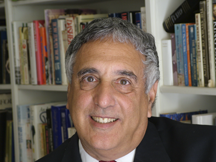 The
Jewish
Citizen The
Jewish
Citizen
by Donald H. Harrison
__________________________________________________
Rabbi urges Jewish community to 'take
responsibility' for members' slavery roles
CARDIFF BY
THE SEA, Calif –Reform Rabbi David Frank of Temple Solel said it is
right and just that the Alabama Legislature went on record expressing
“profound regret” for its state’s role in slavery and formally
apologizing for slavery’s wrongs.
Now, some segments of the American Jewish community also need to take
responsibility, the rabbi said.
”We American Jews are not completely innocent,” he told his congregation
during Shabbat services on Saturday, May 26. “We were on both
sides of the slavery debate.”
He pointed out that “some famous American rabbis were in favor of
slavery,” and that they argued that there was biblical justification for
the practice. Furthermore, Frank said, some American Jews both in the
north and the south were slaveholders or had been engaged in the slave
trade.
”So, lest we American Jews think we had nothing to do with this issue,
we need to think again and to take some responsibility ourselves.”
Frank also noted in his sermon that there also were pro-abolition rabbis
who equally based their opposition to slavery on religious grounds.
Jews customarily do not take written notes during Sabbath services,
however, Frank made the outline version of his sermon available today to
the San Diego Jewish World.
As there was division in the Jewish community over slavery, so too was
there later division in the community over desegregation, Frank noted.
“It’s not enough to emancipate slaves, nor to desegregate cities and
schools and then claim we’re done,” he said. “As Torah teaches us, the
sin continues to live until we articulate our guilt. This is the
importance of Alabama’s new resolution.”
An apology “gives voice to our wrongdoing as a nation. It helps us take
ownership of the racial inequality that was and that still is
reality in this country.”
Frank said an apology is “not just for the victim’s satisfaction, but
for our redemption as well, for only by owning the problem can we fully
engage in solving it.”
The rabbi said in that week’s Torah portion, Naso, there is a discussion
of the priestly blessing that the rabbi delivers with both hands
outstretched. Commentators have explained the reason for this custom is
“to serve as a reminder that our hands must always be joined to our
words.”
He added: “I sincerely hope that as a nation, the same can be true of
us. We are responsible for a great injustice. As we now voice
collective guilt , let us also act with our collective conscience to
join hands in bringing true equality and prosperity to all those within
our borders.”
|
|
Arts,
Entertainment& Dining |
What I
Expect From Music.. a reply to David Amos
SAN DIEGO— What
a pleasure to find Columnist David Amos’s very interesting
article yesterday “Just
What Do We Expect from Music? A good question….and I have several answers. It
depends upon who I am and what I’m doing with the music.
Personally, as a
dancer, the music is everything. However, dance doesn’t need music to “be” –
dance can happen without music, it did initially. Merely, stamping feet or
clapping hands, or even in time with one’s own breath and heartbeat. There are
some choreographers who compose the dance first and then seek out music.
Personally, I find that amazing as for me it is the music that compels my
dance. It frames it, impels it, speaks through it and finally ends it. It is
the scaffold, the bridge, the house and the cloak. Music sets the entire tone.
This becomes clear in an example such as the opening chords of Prokofiev’s
Romeo and Juliet – the scream of oncoming tragedy is announced from those
chords. We are warned. All else, including dance, follows.
It is possible for
great music to overwhelm dance, but only if the choreographer is not up to the
standard of the composer. Such a piece of music is Bach’s Toccata
and Fugue in D Minor – until Paul Taylor choreographed Promethean
Fire. It is also possible for great dance to be under whelmed by music such
as Michael Smuin’s ballet Song for Dead Warriors (San Francisco
Ballet). Excellent choreography, terrific dancers, dead music – and so the
entire thing died.
As a ballet teacher,
the music for class must carry the work, inspire the students and yet not
distract them from the business at hand, which is studying the technical values
of the dance. This is truer for the beginner rather than the more proficient
student. For the beginner, the music needs to be simple, and unassuming.
“There," but not intrusive. For the more proficient student, the music should
begin to inform and challenge the dancer.
In ballet (and other
dance genres, too) the energy of both the music and the teacher carries the
class. If either fails the class dies. In the ballet world there are several
major syllabus regimes – I won’t go into them now – but they are structured
systems by which to teach ballet. They are very popular abroad, less so in the
United States. I rejected the opportunity to be mentored into one the major
syllabus systems for a number of reasons but largely because the music was
preset. The same exact music for the same exact class. No deviation. This for
me meant mental, emotional and pedagogical death. I would be bored past tears
to have to dance/teach everyday to the same music. I need the stimulation of
the music to dance. The same sequence (enchainement) of dance steps takes on an
entirely different meaning when danced to a suite from Carmen rather than
Beethoven’s Pastoral. The retards, rests, arpeggios, grace notes, add
layers, breath, meaning, emotion to the dance. A waltz in a major key is quite
a different entity from a waltz in a minor key.
A pianist who plays
for ballet class is a true artist, and is never taken for granted. His music
changes for the mood of the day, for the class at that moment. It changes not
only for the form of the dance (waltz, mazurka, adagio, petite allegro, grand
allegro, etc), but for each dancer. I remember all these decades later a
superlative ballet pianist who was a specialist in the field – he “felt” each
student’s impetus and played for each one individually. The same notes infused
with different breath. It was a study in musicianship.
I once had the unique
experience of teaching private ballet class to a totally deaf adult student. I
set the tempo for her by clapping my hands which she could visually mimic. But
I realized I had to have music for myself – I simply couldn’t demonstrate what I
wanted her to do without having music playing for myself. It was an interesting
illustration to me of how much I was dependent upon it.
Some dancers are
“counters” and some are “breathers.” Some simply count the music constantly
while others never count. Most do both – more counting with modern music, more
breathing with classical composers. But, even for the “breathers” – there is an
inner metronome. I found when I had spent hours of the day dancing and
teaching, it was hard to turn that metronome off!
As for when I’m not
dancing, just listening, working at my craft table, driving, or writing, I can’t
bear to listen to music that doesn’t suit my mood. Sometimes I’m in a waltz
mood, sometimes Klezmer. If the “wrong” music is playing its like nails on a
chalkboard – even if it’s something I ordinarily would like.
For the most part, I
am much more of a classicist than into new music, I find it much too repetitive.
It also doesn’t seem to have form – or at least I can’t detect any. It sort of
wanders around, while I seek structure. I can’t help thinking it would make
Mozart cry. The only time new music works for me is if it is expertly
choreographed and truly fits the dance. But, I can’t listen to it alone –
without dance – simply for itself.
One of my biggest
complaints, however, is the volume. Music that makes my theater seat vibrate
either causes me to use my ear plugs or leave. Music is not about volume for me
– it is about mood. Not necessarily the mood I’m in, but the mood I would like
to be in.
ZOA...
(Continued from above)
The
survey, which estimates the U.S. Muslim population to be 2.3 million, emphasized
the more positive findings, describing Muslim Americans overall as "middle class
and mostly mainstream," socially assimilated and happy. Yet, however prosperous
and settled Muslim Americans may be, these findings reveal a disturbing level of
extremism in a large segment of American Muslims.
Analysis
by Muslim moderates:
-
Dr.
Zuhdi Jasser, chairman of the Arizona-based American Islamic Forum for
Democracy : "We should be disturbed that 26 percent of these young people
support an ideology in which the ends justify the means … the survey also
found that only 40 percent of the overall American Muslim population would
even admit that Arabs were behind 9/11. They're in denial, refusing to take
moral responsibility, and the radicals will feed on this," (
Frontpagemag.com, May 23)
-
Dr.
Tawfik Hamid, former member of the Islamist terrorist group Jemaah Islamiya,
now a Muslim reformer : "While the survey has been represented in the media
as proof of moderation among American Muslims, the actual results should
yield the opposite conclusion. If, as the Pew study estimates, there are
2.35 million Muslims in America, that means there are a substantial number
of people in the U.S. who think suicide bombing is sometimes justified.
Similarly, if 5% of American Muslims support al Qaeda, that's more than
100,000 people" (
Wall Street Journal, May
24).
ZOA
National President Morton A. Klein said, "We have reason for profound concern at
these findings about the attitudes of Muslim Americans. Despite being in the
main a settled, prosperous community, Muslims are clearly not mainstream in
their general political and moral views. A community in which a quarter of the
people justify the abomination of suicide bombings is one that poses a
potentially serious threat to the lives of other Americans. When the views held
are so extreme, it is no reassurance that only a minority of people in a given
community hold them, especially when that minority is large, not merely a tiny
fringe.
"One other
important and easily missed statistic emerges from this survey – the Pew survey
puts the size of the Muslim American population at around 2.35 million – far
less than the 6 -7 million that is routinely announced by some Islamist
organizations, like the Council on American-Islamic Relations (CAIR). The Pew
survey research, which uses Census Bureau data on immigrants' nativity and
nationality, is also broadly consistent with other recent reputable studies,
such as the 2001 American Religious Identification Survey by the Graduate Center
of the City University of New York, which found a total of 1.8 million Muslim
Americans, and that by the University of Chicago's Tom Smith, whose 2000 study
put the Muslim American population at 1,886,000. In fact, it is possible that
the latest Pew study even somewhat overestimates the present number of Muslim
Americans. Be that as it may, the Pew survey figure is an important statistic
for the media that often uncritically accepts whatever claims are made by
Islamist organizations, which have an obvious interest in inflating the figures.
"We at ZOA,
will do everything we can to make Members of Congress and the American public
aware of these disturbing results which show that Muslim Americans may not be as
mainstream and moderate as all of us had hoped."
(Return
to top)
Russians...
(continued from above)
Sharansky explained in passing how the compulsion of Soviet Jews to excel in
their professional lives was an expression of their identity in a society
where nearly all of them were completely disconnected from knowing what it
meant to be a Jew in any other way.
Today, more than one million Jews from Russian-speaking countries live in
Israel. Their presence has changed the face of Israeli society in many
spheres—they’re the brains behind our bio-tech and hi-tech industry;
hospitals and clinics are full of Russian-speaking doctors and technicians;
Israel would have few world class sports figures or sports trainers without
the Russian speakers and our arts scene is filled with musicians, artists
and actors trained in the academies of Moscow and St Petersburg.
Back at the Sergei Courtyard the strains of Bach and Mozart waft over the
appreciative audience seated in the area that once housed the stables for
the upper-class Russian pilgrims who lodged in the building. There are a few
remaining buildings scattered through the city erected by various European
empires in the waning colonial era, designed to accommodate Christian
pilgrims and shore up the prestige of the regimes back home. The Russians
were merely the most prolific of the builders. Just in back of the elegant
Sergei structure whose grand entryway features an elegant turret and
crenellated parapets, sits another building designed and erected by 19th
century Russians--the prison known simply as the Russian Compound, where
Arab terrorists, Jerusalem thieves and political demonstrators all pass
their first interrogation.
After a pleasing series of classical pieces, the ensemble leader introduces
Dr. Alexander Rosenberg, a forty-something accordionist who could be
mistaken for a boxer. Rosenberg joins with the string players in an
astonishingly versatile selection of Brazilian and French numbers, each
painstakingly introduced in heavily accented Hebrew.
As Rosenberg takes in the applause, an audience member yells out in Hebrew,
“Play some Russian tunes.” Without missing a beat, the middle-aged blonde
lead violinist shoots back: “In Russia…”
Introducing the next piece, the ensemble leader announces, “Now we’ll play
some nice Russian music.” They launch into Scott Joplin’s Ragtime.
In the end, with smiles on their lips, they can’t resist playing some
classic Russian music. Prince Sergei
would have been proud
|
 Jerusalem Diaries
Jerusalem Diaries The
concert is one of a series of free events under the rubric of the annual
two-week Israel Festival. In addition to the regular ticketed performances
that fill the city’s concert halls with musicians, dancers and actors from
all over the world, some of Jerusalem’s more unique venues play host to free
events every night.
The
concert is one of a series of free events under the rubric of the annual
two-week Israel Festival. In addition to the regular ticketed performances
that fill the city’s concert halls with musicians, dancers and actors from
all over the world, some of Jerusalem’s more unique venues play host to free
events every night.  Sharansky
views the Six Day War in terms of the beginning of the fall of the Soviet
empire. In his view, the 1967 war brought with it the sobering realization
for the Soviets that they would not dominate the Middle East, as well as the
emboldening of Jewish national identity amongst Soviet Jews who would begin
to agitate to leave the Soviet Union creating a movement
Sharansky
views the Six Day War in terms of the beginning of the fall of the Soviet
empire. In his view, the 1967 war brought with it the sobering realization
for the Soviets that they would not dominate the Middle East, as well as the
emboldening of Jewish national identity amongst Soviet Jews who would begin
to agitate to leave the Soviet Union creating a movement 
 Jews
in the News
Jews
in the News -----------------------------------------------------------------------------------------------------------------
-----------------------------------------------------------------------------------------------------------------
 The
Jewish
Citizen
The
Jewish
Citizen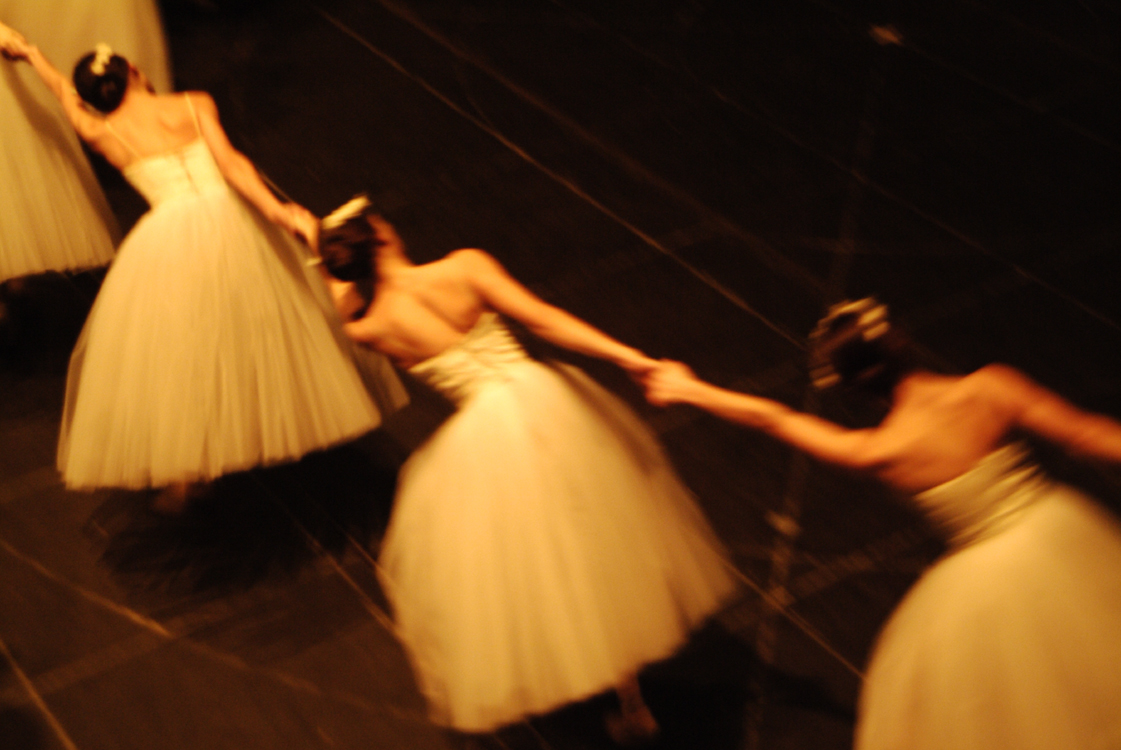 Dance~The Jewish
Dance~The Jewish